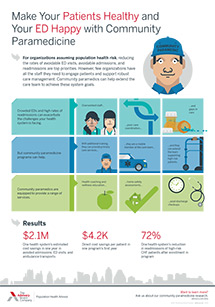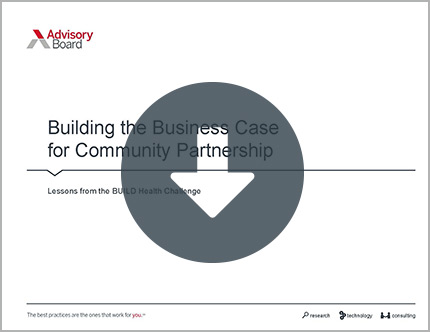Auto logout in seconds.
Continue LogoutAcross the country, health systems, nonprofits, and other community organizations are adopting programs designed to support and train family caregivers.
May 17 webconference: Care Management 101
Background
According to NPR's "Shots," an estimated 42 million family members and friends serve as the primary caregivers of adults and children who are recovering from a surgery or illness or who have a long-term disability or medical condition, such as Alzheimer's disease. In addition to household tasks such as meal prep and cleaning, these individuals perform a variety of medical tasks, such as administering medication, assessing blood pressure, and changing bandages—often with little or no training.

Make your patients healthy and your ED happy with community paramedicine
Research has shown that the burden of caregiving can take a toll. A 2015 JAMA study found family caregivers are nearly twice as likely to experience emotional and physical problems as other U.S. adults. For those who are able to maintain jobs, the study found caregivers are three times more likely to have work-related productivity problems than other U.S. adults. As the level of care intensifies, the researchers found, the negative effects of caregiving became greater.
Federal, state efforts to improve caregiving
President Trump in January signed a bipartisan bill directing HHS to develop and maintain a national strategy to support U.S. family caregivers. Under the law, HHS must establish an advisory council to help develop a strategy that identifies steps communities, employers, governments, health care providers, and others can take to recognize and support family caregivers.
Meanwhile, the District of Columbia and 42 states have passed legislation requiring hospitals and other nursing facilities to record the patient's caregiver at admission and discharge and to offer trainings for caregivers who are responsible for performing medical tasks. However, several states—such as Alabama, Florida, Georgia, Idaho, South Carolina, South Dakota, Vermont, and Wisconsin—do not have such legislation, which "Shots" reports means patients can be discharged without caregivers being briefed on the care patients will need.
How institutions, people are responding to the needs of caregivers
In response to those gaps, health systems and other organizations are adopting and creating programs to relieve caregivers' burdens and provide needed medical guidance.
For instance, Eric Coleman, a gerontologist who received a MacArthur Foundation fellowship in 2012, developed the Care Transitions Intervention (CTI) model to train coaches—often nurses, social workers, and others hired by hospitals and other facilities—to work directly with caregivers to make it easier to provide home care for patients.

Build the business case for community partnership
Under the CTI model, coaches speak with caregivers before patients are released from a hospital and then follow up with a one-hour coaching session at the patient's home and three subsequent phone calls. Coleman noted that caregivers might not remember or fully comprehend the instructions given at a hospital or clinic, which are often explained using medical jargon. But Coleman said under his model, "We tell people that for the next 24 to 48 hours, here are key things you need to do. Then we follow up at home." Coleman said research has shown readmissions can drop by 20% to 50% when caregivers have some form of transition coaching.
According to "Shots," a consortium of five groups and five hospitals in Virginia are using the CTI model to train caregiver coaches to help caregivers with food, medicine, at-home medical procedures, and other challenges, such as transportation. Over the path two and half years, the consortium has helped 26,000 caregivers and patients, and hospital readmission rates have decreased from 23.4% to 9%, according to Kathy Vesley from the Bay Area Council on Aging in Virginia.
Dignity Health also has teamed up with the nonprofit Santa Barbara Foundation to train its own caregiver coaches. Kathleen Sullivan, VP of acute care services for Dignity, said 1,000 caregivers are being coached at any given time. Dignity now views caregivers are partners in patient care, Sullivan said. "They're given a badge, they have a tote bag with information, and the hospital knows who to contact," she said (Fetterman, "Shots," NPR/Kaiser Health News, 4/27).
May 17 webconference: Care Management 101
Join this webconference for a brief overview of developing a high-performing care model across five attributes of effective care management organizations.
Don't miss out on the latest Advisory Board insights
Create your free account to access 1 resource, including the latest research and webinars.
Want access without creating an account?
You have 1 free members-only resource remaining this month.
1 free members-only resources remaining
1 free members-only resources remaining
You've reached your limit of free insights
Become a member to access all of Advisory Board's resources, events, and experts
Never miss out on the latest innovative health care content tailored to you.
Benefits include:
You've reached your limit of free insights
Become a member to access all of Advisory Board's resources, events, and experts
Never miss out on the latest innovative health care content tailored to you.
Benefits include:
This content is available through your Curated Research partnership with Advisory Board. Click on ‘view this resource’ to read the full piece
Email ask@advisory.com to learn more
Click on ‘Become a Member’ to learn about the benefits of a Full-Access partnership with Advisory Board
Never miss out on the latest innovative health care content tailored to you.
Benefits Include:
This is for members only. Learn more.
Click on ‘Become a Member’ to learn about the benefits of a Full-Access partnership with Advisory Board
Never miss out on the latest innovative health care content tailored to you.
